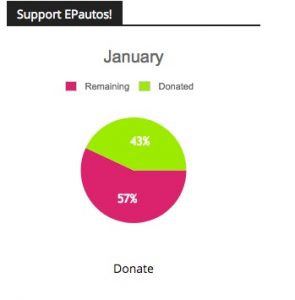The hunchback Plantagenet Richard III’s last words were reportedly, “my kingdom for a horse”! – which he didn’t get. He was slain by Henry Tudor (father of Henry VIII) on Bosworth field.
Well, I need neither a horse, nor a kingdom – and I’m not a spavined hunchback, either.
But I do need your support – and this is one of my occasional (and reluctant) fund-raising appeals. They are necessary in order for independent media such as EPautos to survive in an environment dominated by a conglomerated corporate nexus which uses its domination to economically strangle any outlet that mentions unmentionable things.
It does so by blackballing the offending site from the 90-plus percent of advertising revenue it controls, “de-platforming” and “de-listing.” Since most media outlets have to earn their keep – generate enough money to pay for the staff to write/produce the articles, technical support and for hosting and so on – they are effectively forced to bend knee to the oligarchy.
The only way around this is direct reader support – which is how EPautos stays afloat.
We’re a bit low right now – and that’s why the post.
If you like what you’ve found here please consider supporting EPautos.
We depend on you to keep the wheels turning!
Our donate button is here.
If you prefer not to use PayPal, our mailing address is:
EPautos
721 Hummingbird Lane SE
Copper Hill, VA 24079
PS: Get an EPautos magnet (pictured below) in return for a $20 or more one-time donation or a $5 or more monthly recurring donation. (Please be sure to tell us you want a sticker – and also, provide an address, so we know where to mail the thing!)
My latest eBook is also available for your favorite price – free! Click here. 












The USA is collapsing.
The US is in debt, is conducting multiple wars, is a police state, is flooded by illegal immigrants, and has become immoral.
Americans are either ignoring the decay or think that nothing can be done to stop the decline. Almost no one thinks the US can be saved.
No one appears to be worried about tyranny because liberals think the police state only applies to conservatives and conservatives think the police state only affects liberals.
The truth seems to be that the elites want to wipe out the strong white men and plan to send the weak liberals to the gulags where they will be starved and killed. The 1% will then divide the wealth and land of the US among themselves.
How else can you explain the destruction of the USA? Economics isn’t rocket science. If you want a strong economy, don’t punish hard work with taxes and regulations while rewarding laziness with welfare and allowing millions of 3rd world immigrants to flood the country.
Those fail to learn from history are doomed to repeat it.
Sadly Americans won’t realize what is happening until it is too late.
Never underestimate the inhumanity of man towards man. Greed has no bounds.
Wake up.
Think.
Pass the word.
“If you want to consume McDonald’s, be my guest. If you want to read whatever LinkedIn calls news, go right ahead. But if you actually want to learn, to improve your mind, to improve your awareness and understanding of the world, you have to shell out. Start paying. If you’re about to read articles for an hour or two, start thinking about what that time is worth and whether you can spend more to maximize the quality of what you are reading.”
https://techcrunch.com/2018/02/07/brainjunk-and-the-killing-of-the-internet-mind/
Thanks for linking to this article, RK – it’s good stuff. As a publisher as well as a writer, the topic is of particular interest to me. On the one hand, I have and enjoy complete editorial freedom – something I never had when I worked for newspapers (and wrote for them). On the other hand, it’s become much harder to make a living – even to pay basic expenses – even if one has a larger readership, which is unprecedented. This site has a circulation/readership comparable to a reasonably successful print magazine. A magazine that could afford a staff – as well as an office. But the online equivalent – this site – is a one-man show and operates on a shoestring. Reason? Because anything that is online can be read for freeeeeeeeee. This includes even the material behind pay firewalls, because all someone with access has to do is copy/past and post it somewhere else.
This is why – inside baseball – a 3,000 word feature article I sold for $2,500 back in the ’90s now sells (if it sells at all) for maybe $75 or so. If you’re lucky.
A quarter-page print ad that sold for $10,000 in the ’90s is a pennies-per-click deal today.
I think, though, that it’s probably hopeless (and maybe unsound policy) to attempt to make people pay. I much prefer my model of suggesting that people do, if they think the material here is worth supporting.
So far, it’s worked. I’m not getting rich – and (full disclosure) don’t care about that. If I did, I would have taken the job at the WSJ back in ’97. I just want to be able to continue doing this – ideally with enough margin to hire someone to help with copy editing and – of course – a full-time computer guru, too.
I think we’re at a crossroads. Since the 1990s the cost of sending a bit across the network has dropped by 99%. The big content creators seem to be doubling down on expensive products that are designed to appeal to as large an audience as possible. That means editorial content that is intended to create an emotional reaction over providing balance or even factual information. And because every newsroom is painfully aware of their declining readership/viewership the advertiser (who now has a disproportionate responsibility for revenue after the decline of classified ads) is going to be in the back of the journalist’s and editorial staff’s minds. Oh sure, there’s a Chinese wall, but come on, these guys know what would happen if they reported (for example) that every mass shooter has been on some sort psychotropic drug.
So like it or not, this is the future of media. It is no longer “mass” media, and won’t garner the big revenue numbers of the past, but it will be much more democratic. And should be much more difficult to manipulate. The downside is we will probably lose the golden age of celebrity and millionaire news readers, but then again maybe people will get into journalism because they love the field, not because they want to be noticed at the grocery store.
Oh, and as for that million dollar production? I get more entertainment from watching a pair of hands on a workbench tear down a “Chineseium” battery drill than I do from the latest CGI masterpiece.
https://www.youtube.com/user/arduinoversusevil
Morning, RK!
Yes, indeed. Even back in the ’90s – when print media was still a going concern – I knew (even if I was not actually told) that writing about certain things or in a certain way would lose me my job because it would offend advertisers. I am free of that worry now – and I like the connectedness I have with the readers here, who support the site because they want to.
The problem is that it’s a very tight squeeze. I manage because I’m a middle-aged divorced dude without a wife or kids to support and who can risk going without health insurance and lives very close to the bone. But most people – people who want a life, anyhow – need to earn more in order to have that life. Since most people do want a life – a family, especially – it drives out a lot of people who might be able to and inclined to do worthwhile reporting/commentary.
Adam Curry (that guy from MTV) calls it the “value for value” business model. After he left MTV he ran a few Internet media startups and quickly learned that there’s really no way to monetize a network. But then he did just that by becoming a podcast pioneer (actually he, along with Dave Winer, came up with the RSS media container that makes podcasting work). He’s in a similar boat with his podcast The No Agenda show, living largely hand-to-mouth, but it’s been around for 10 years now and still going. Much of that is because he produces it like a 1990s Morning Zoo radio program (keeping production costs low) and has a group of people who work for peanuts because they believe in the program, or they’re building up their resume’ or whatever. And the key is that if you pay for something you’ve made a conscious choice and you’re more likely to visit more often, getting even more out of the community, leading to more contributions.
Marketing and promoting your site is probably the hardest part of the model, and you seem to have done a pretty good job of that. It helps that you have excellent content and good credentials, that makes it easier. You also have a pretty good core of enthusiastic fans who spend a whole lot of time here. But I’d bet paying viewers are only around 1% or so. That might be pretty good, hard to tell. And I’ll bet a fair number of viewers think you’re asking them to fund your business jet, not keep food on the table. But even if you’re trying to pay for Jet-A, who the hell cares? If I’m getting some pleasure from spending time in your sandbox, why not pay up? If you’re funded well enough to afford to fly off to Aspen for the weekend, that means you don’t have to worry about being de-platformed either.
I’d like to help, but I’m as clueless as everyone else. I reckon there’s wisdom to be found in Zig Ziglar and Tom Peters, and Tom Woods for that matter, for tips to appeal directly to people’s wallets. Maybe feeding egos by listing donors (I hate that term BTW) over a certain amount, or prominently promoting set monthly subscriptions -with links to pre-populated PayPal forms, right up top in the masthead. One thing that Adam and John do is mention the amount donated, which is pretty surprising in many cases far exceeding what I would consider a reasonable amount. I know you have the pie chart graphic, but maybe something a little less subtle?